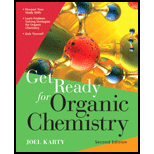
Get Ready for Organic Chemistry
2nd Edition
ISBN: 9780321774125
Author: KARTY, Joel
Publisher: PEARSON
expand_more
expand_more
format_list_bulleted
Concept explainers
Question
Chapter 2, Problem 2.19YT
Interpretation Introduction
Interpretation:
The two unlabeled ester groups in the fat molecule in Equation 2-4 are to be circled and labeled.
Concept introduction:
A fat or oil is a triglyceride. It is formed by esterification reaction between glycerol (
Expert Solution & Answer
Want to see the full answer?
Check out a sample textbook solution
Students have asked these similar questions
Why doesn't this carry on to form a ring by deprotonating the alpha carbon and the negatively-charged carbon attacking the C=O?
6. A solution (0.0004 M) of Fe(S2CNEt2)3 (see the structural drawing below) in chloroform
has absorption bands at:
350 nm (absorbance A = 2.34);
514 nm(absorbance A = 0.0532);
Calculate the molar absorptivity values for these bands. Comment
on their possible nature (charge transfer transitions or d-d
S
N-
transitions?).
(4 points)
What is the mechanism for this?
Chapter 2 Solutions
Get Ready for Organic Chemistry
Ch. 2 - Prob. 2.1PCh. 2 - Prob. 2.2PCh. 2 - Prob. 2.3PCh. 2 - Prob. 2.4PCh. 2 - Prob. 2.5PCh. 2 - Prob. 2.6PCh. 2 - Prob. 2.7PCh. 2 - Prob. 2.8PCh. 2 - Prob. 2.9PCh. 2 - Prob. 2.10P
Ch. 2 - Prob. 2.11PCh. 2 - Prob. 2.12PCh. 2 - Prob. 2.13PCh. 2 - Prob. 2.14PCh. 2 - Prob. 2.15PCh. 2 - Prob. 2.16PCh. 2 - Prob. 2.17PCh. 2 - Prob. 2.18PCh. 2 - Prob. 2.19PCh. 2 - Prob. 2.20PCh. 2 - Prob. 2.21PCh. 2 - Prob. 2.22PCh. 2 - Prob. 2.23PCh. 2 - Prob. 2.24PCh. 2 - Prob. 2.25PCh. 2 - Prob. 2.26PCh. 2 - Prob. 2.27PCh. 2 - Prob. 2.28PCh. 2 - Prob. 2.29PCh. 2 - Prob. 2.30PCh. 2 - Prob. 2.31PCh. 2 - Prob. 2.32PCh. 2 - Prob. 2.33PCh. 2 - Prob. 2.34PCh. 2 - Prob. 2.35PCh. 2 - Prob. 2.36PCh. 2 - Prob. 2.37PCh. 2 - Prob. 2.38PCh. 2 - Prob. 2.39PCh. 2 - Prob. 2.40PCh. 2 - Prob. 2.41PCh. 2 - Prob. 2.42PCh. 2 - Prob. 2.43PCh. 2 - Prob. 2.44PCh. 2 - Prob. 2.45PCh. 2 - Prob. 2.46PCh. 2 - Prob. 2.47PCh. 2 - Prob. 2.48PCh. 2 - Prob. 2.49PCh. 2 - Prob. 2.50PCh. 2 - Prob. 2.51PCh. 2 - Prob. 2.52PCh. 2 - Prob. 2.53PCh. 2 - Prob. 2.54PCh. 2 - Prob. 2.55PCh. 2 - Prob. 2.56PCh. 2 - Prob. 2.57PCh. 2 - Prob. 2.58PCh. 2 - Prob. 2.59PCh. 2 - Prob. 2.60PCh. 2 - Prob. 2.61PCh. 2 - Prob. 2.62PCh. 2 - Prob. 2.63PCh. 2 - Prob. 2.64PCh. 2 - Prob. 2.65PCh. 2 - Prob. 2.66PCh. 2 - Prob. 2.67PCh. 2 - Prob. 2.68PCh. 2 - Prob. 2.69PCh. 2 - Prob. 2.70PCh. 2 - Prob. 2.71PCh. 2 - Prob. 2.72PCh. 2 - Prob. 2.1YTCh. 2 - Prob. 2.2YTCh. 2 - Prob. 2.3YTCh. 2 - Prob. 2.4YTCh. 2 - Prob. 2.5YTCh. 2 - Prob. 2.6YTCh. 2 - Prob. 2.7YTCh. 2 - Prob. 2.8YTCh. 2 - Prob. 2.9YTCh. 2 - Prob. 2.10YTCh. 2 - Prob. 2.11YTCh. 2 - Prob. 2.12YTCh. 2 - Prob. 2.13YTCh. 2 - Prob. 2.14YTCh. 2 - Prob. 2.15YTCh. 2 - Prob. 2.16YTCh. 2 - Prob. 2.17YTCh. 2 - Prob. 2.18YTCh. 2 - Prob. 2.19YTCh. 2 - Prob. 2.20YT
Knowledge Booster
Learn more about
Need a deep-dive on the concept behind this application? Look no further. Learn more about this topic, chemistry and related others by exploring similar questions and additional content below.Similar questions
- For questions 1-4, consider the following complexes: [Co(CN)6], [COC14]², [Cr(H2O)6]²+ 4. Room temperature (20°C) measurement of molar magnetic susceptibility (Xm) for Fe(NH4)2(SO4)2×6H2O is 1.1888 x 102 cgs (Gaussian units). Calculate effective magnetic moment and provide a number of unpaired electrons for the iron ion. Use this number to rationalize the coordination geometry around iron center. (4 points)arrow_forward7. Describe the expected 31P and 19F (where applicable) NMR spectral patterns for the following compounds (indicate number of signals and their splitting patterns). a) tetraphenyldiphosphine Ph Ph P-P Ph Ph Ph Ph ' b) tetraphenyldiphosphine monoxide P-P-Ph Ph (2 points) (2 points c) tetrafluorophosphonium hexafluorophosphate [PF4]*[PF6]¯ (4 points)arrow_forward3. For questions 1-4, consider the following complexes: [Co(CN)6]4, [COC14]², [Cr(H2O)6]²+ Which (if any) of these complexes would be expected to display Jahn-Teller distortion? (2 points)arrow_forward
- What is Instrumental Neutron Activation and what are the advantages and disadvantages in using its applications? (I'm doing an in class assignment and need better understanding of what the instrument can be used for) Please include references so that I can better understand the application of how the instrument works!arrow_forwardWhat is Isotope Analysis and what are the advantages and disadvantages in using its applications and instrumentalization? Please include references so that I can better understand how the instrument works!arrow_forward5. Count the electrons on the following complexes and state whether they follow the 18- electron rule: (3 points) Fe(CO)5 Ni(PMe3)4 PMe3 is trimethylphosphine Mn(CO)5Brarrow_forward
- For questions 1-4, consider the following complexes: [Co(CN)6]+, [CoCl4]², [Cr(H2O)6]²+ 2. Draw the corresponding d-orbital splitting for each of the complexes; predict the spin- state (low-spin/high spin) for each of the complexes (if applicable); explain your arguments. Calculate the crystal field stabilization energy for each complex (in Ao or At). (6 points)arrow_forwardFor questions 1-4, consider the following complexes: [Co(CN)6]4, [COC14]², [Cr(H2O)6]²+ 1. Assign oxidation number to the metal, then indicate d-electron count. (3 points)arrow_forwardUsing iodometry I want to titrate a sodium thiosulfate solution and I use 15 mL. If I have 50 mL of a 0.90 M copper solution and KI, what will be the molarity of sodium thiosulfate?arrow_forward
arrow_back_ios
SEE MORE QUESTIONS
arrow_forward_ios
Recommended textbooks for you
 Organic Chemistry: A Guided InquiryChemistryISBN:9780618974122Author:Andrei StraumanisPublisher:Cengage Learning
Organic Chemistry: A Guided InquiryChemistryISBN:9780618974122Author:Andrei StraumanisPublisher:Cengage Learning

Organic Chemistry: A Guided Inquiry
Chemistry
ISBN:9780618974122
Author:Andrei Straumanis
Publisher:Cengage Learning